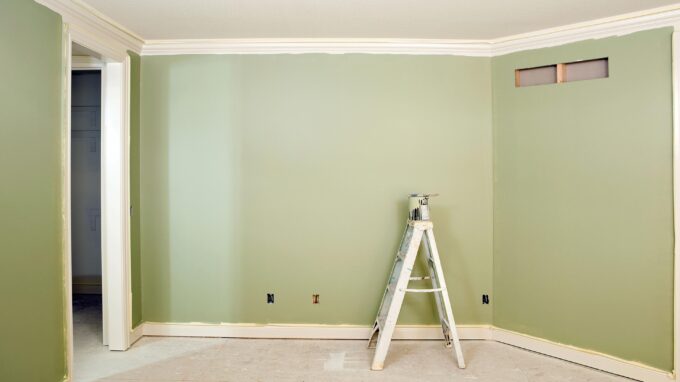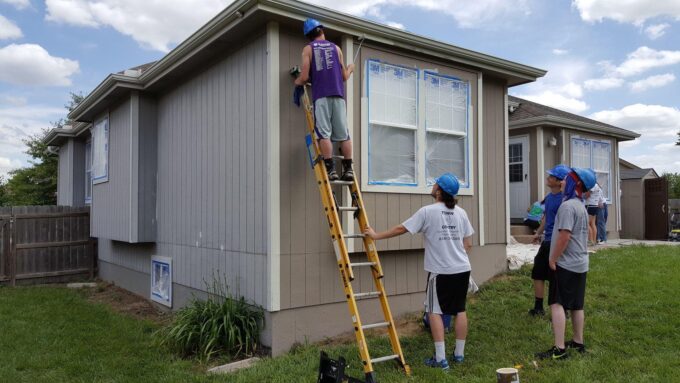All companies regardless of the field they operate in, face certain risks as they do business; risks that should be covered by insurance. The same applies to painting businesses.
Running a painting business can seem straightforward, especially if you’re just starting out. A painting business has sustained demand and little overhead to be concerned about. There’s also the thought of committing thousands of dollars of your capital to pay for an insurance policy that may seem a bit too excessive for your budget.
But in case you were not aware, painters can be sued for many reasons.
Examples of Situations That a Painting Business Would Require Insurance

If your painter is working on a home renovation project and they inadvertently spill a can of paint all over the floor, the client can sue your company to replace the floor as well as the cost of temporary housing as you complete replacing the floor.
If the client trips over a painting ladder that was left out and they get seriously injured, the homeowner can sue your business to cover the hospital bills as well as compensation for lost income they’d have earned while working in full fitness.
However, painters insurance will protect your business against such risks as well as anything that could result in property damage. A single incident might be very hard, or even impossible to get through for a business without the right painting insurance policy.
Here is a brief list of insurance policies ideal for a painting business. See more.
General Liability Insurance

Many painting businesses experience liabilities of a similar nature such as accidentally hurting someone as you go about your work or damaging a client’s property. If you’re an independent contractor or a firmly established business, both sets of painters have the same liability exposures and legal obligations.
For these reasons, general liability insurance is a crucial yet standard insurance policy for your painting business. It’s actually mandatory in many states for contractors to work having taken a general liability insurance cover.
Not only will it offer you protection from property damage and bodily injury claims but it will also pay for your legal fees. Visit CaspianInsurance to learn more about business insurance.
Commercial Property Insurance

Are you familiar with the phrase, ‘what’s a painter without a paintbrush?’ Whoever came up with that clearly did not know just how much some painting equipment and supplies actually cost, more so in the modern day where tools are becoming more sophisticated, and more expensive.
You can easily damage your equipment or lose them through theft. Worksites can be an easy target for thieves, especially if it’s a sizable project with several people constantly moving in and out.
As a painter, you rely on your tools every day to get the job done. If they get stolen, you might need to put your work on hold, which will cost your business even more money. But with commercial property insurance, your equipment and supplies will be replaced or repaired in case they get damaged or stolen.
It’s worth pointing out that this policy also covers business premises. If you store your supplies and tools at your house, a homeowner’s policy usually covers up to $500 in commercial property damages so it’s best that you invest in a commercial property insurance cover.
Workers’ Compensation Insurance

For a painting business, this insurance policy can serve two functions.
The first is that it assures injured employees have their medical costs taken care of in the event an accident leads to bodily harm. It also provides compensation for the income your employees lose while unable to work. The second function is that it will protect your business from lawsuits by employees who get hurt while on the job.
Perhaps the most appealing aspect of this particular cover is that the employees receive benefits regardless of who is at fault for the accident. If an employee loses their life, the insurance company will provide death benefits to the bereaved.
Ideally, you’ll find that there are two main situations that will require you to have taken this policy with the first being when the client requires you to have your own workers’ compensation insurance. Some clients ask for this so that if you do get hurt on the job while working on their project, they could be held liable and they want to minimize such risks.
The second scenario that will require you to have a worker’s compensation cover is if you’ve hired employees to work for your business. It is of no consequence whether the employees are on a part-time or full-time basis. Oftentimes, your business will be held liable if an employee gets hurt while working for you.
However, try and familiarize yourself with the compensation laws within your state. These laws tend to differ with no two states having the same regulations.
How Much Does Painters Insurance Cost

Now we’ve arrived at the business end of the topic. To find out how much your painting business should be paying in insurance, you first have to consider what policy it is that you’re taking and what protection it offers your business.
You also have to factor in how long you need your insurance policy cover to stay active. If you’re doing a one-off job, then your policy could be as short as a day. If you’re in business for the long haul, then you need to invest in a policy that insures you for several months or a year.
Your policy limit will also have a say in how much you’ll be paying in premiums. The higher your limit is, the more expensive your policy.
The Bottom Line
As explained above, painting companies require insurance to succeed. It matters little if you’re a freelancing painting contractor, a small upcoming painting business, or a large enterprise with a good number of employees on your payroll.
If an accident happens and you’re not equipped with the right insurance cover, a small incident can easily turn into a big and very expensive problem.
The work of a painter, just like all contractors, is physical and naturally, has its risks. The right insurance coverage will protect you and your painting business from risks that could cause property damage, spilled paint, body injuries, and many other likely but unforeseen events.









